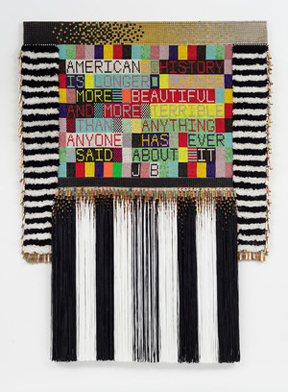Jeffrey Gibson (b. 1972), who is half Choctaw and half Cherokee, creates sculptures and paintings that intermingle traditional Native American craft with contemporary art and culture. Native American craftsmanship and contemporary pop culture coexist comfortably, resulting in an amalgam of the artist’s vast personal interests in popular music and literature, his political views, and his rich heritage.
The show presents 15 new works that bring together elements of indigenous art and craft, politics, music, fashion, urban subculture, and art history that include Gibson’s famous, elaborately embroidered punching bags (of which only 38 exist in the world today); beaded wall hangings; monochromatic raw-hide paintings; and life-sized sculptures.
Almost all the works in the show contain text that is charged with personal meaning and political themes, elaborately embroidered in beadwork. Gibson does not consider these works as purely fine art, stressing that design too can have powerful content. Texts include appropriated phrases from popular song lyrics, social movements and, as of recently, Gibson’s own writings. His use of language is similar to that of artist, educator and activist, Sister Corita Kent, who like Gibson does, arranged words in scattered and atypical formatting. Sentences are no longer a simple left to right read; they become fragments of a thought floating in one’s mind.
In this exhibition, the two life-sized figures are made from ceramic heads perched on wooden armatures that are draped with heavily adorned cloaks. These beings resemble mythical creatures with secrets to reveal.
Embodying the vitality of Native American powwow dancers, the intricately embellished punching bags are fully remade but maintain the power of its former, pugilistic identity. For Gibson these punching bags personify a range of characters: punks, goths, rockers, queers, dancers, and the underdogs, all of whom have at one point in history, lived life as outsiders. The punching bags acknowledge Gibson’s heritage but at the same time adamantly reject boundaries or associations with any specific culture.
In his new series of beaded wall hangings where the artist references textiles and blankets traditionally worn as robes, Gibson uses graphics and text to allude to immediate social issues. The thoughts behind his activist statements are revealed and become personal reveries. In American History, a beaded quilt composition, Gibson remembers James Baldwin’s famous words,